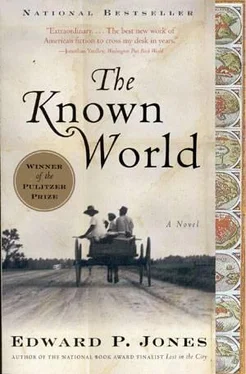Leaving Henry’s place that day, Robbins went to Fern Elston’s before going home to his wife and daughter. What had always surprised him was that he had never seen as many flaws in Henry as he had seen in white men who had enough possessions in their lives to bring on the envious wrath of the gods. Robbins had always believed that the fewer flaws in a man, the fewer doors there were for the gods to enter a man’s life and pull him down to nothing. And not seeing as many failings, Robbins had thought Henry would make a way for himself where even some good and strong white men had faltered and been ground back down to dust. But over the years he had seen enough wrong in the way Henry sometimes conducted himself to worry him. And no failing had worried him more since the day he brought Henry into his life than wrestling around with the slave Moses like some common nigger in from the field after a hard day. How could anyone, white or not white, think that he could hold on to his land and servants and his future if he thought himself no higher than what he owned? The gods, the changeable gods, hated a man with so much, but they hated more a man who did not appreciate how high they had pulled him up from the dust.
Robbins arrived at Fern’s and saw a servant and told that servant to tell his mistress that he wanted to see her. Robbins did not dismount from his horse and had he not seen the servant he would have remained on his horse, waiting until someone noticed he was there and asked if he might be helped. Fern came out of her door and stepped to the edge of the verandah and Robbins took off his hat but still did not dismount. Fern did not come down the steps and so they were more or less eye to eye.
“Fern, good day.”
“Good day, Mr. Robbins.”
“I have someone who needs to be educated, starting with writing and whatnot. He can’t even write his own name. He should know how to do that and much else besides. He should know how to conduct himself in Virginia.”
“I see,” Fern said. She had not heard that he had any more children with Philomena Cartwright, so she thought that he had taken up with another colored woman and now the child of that coupling needed to be educated. She liked to take children at age four; the older they were after that, the more their heads had been filled with nonsense that her teaching could not extract.
“It’s Henry Townsend. I think you know him.”
She laughed, but when Robbins did not, she stopped. “The Henry I know is a man,” she said. “ A man, ” and she made sure that he was looking at her when she repeated herself.
“That be him,” Robbins said. “A far piece from being a boy. But he is coming into himself and I would not want to see him hurt by all that he does not know.”
“A man does not learn very well, Mr. Robbins. Women, yes, because they are used to bending with whatever wind comes along. A woman, no matter the age, is always learning, always becoming. But a man, if you will pardon me, stops learning at fourteen or so. He shuts it all down, Mr. Robbins. A log is capable of learning more than a man. To teach a man would be a battle, a war, and I would lose.”
“Not with Henry, Fern. He would be open to what you had to teach him. I would not come to you about any other Negro.” He had paid her $20 a month to educate Dora and Louis. He had been tempted to have her come to his house and give private lessons to his white daughter, so pleased with what she had done with his black children, but there were some things his wife could not abide and that would have been another door for the gods to come through. Patience, that other daughter, had been educated well enough but not as well as Dora had been taught by Fern. “He would not be as obstinate or as thick as a log.”
“The oldest child ever brought to me was ten years old,” Fern said. “It was a war, but I prevailed. I was also a younger woman.” She looked Robbins in the face, then looked to the side, beyond him out to the place where the gambler Jedediah Dickinson would camp. “So you send word to Henry Townsend to come by here at ten tomorrow morning. Any later than that and he will have failed the first lesson.” She did not say that he himself should tell Henry for she knew he would not go and take a message from a woman not his equal to a man who was not his equal.
“Good,” Robbins said. “Let us wait a week and see what price this will be.”
“It will not be a child’s price. I can practically teach children in my sleep.”
“Tell him nothing about this and I will pay the price of a man. Even the price of three children,” Robbins said. He put his hat back on his head. “Good day, Fern.” He still wanted Henry in any world his black children would have to inhabit, but the wrestling around with Moses had shown him how unprepared Henry was. Fern would see that and she would do what had to be done. That August day the Canadian pamphlet writer, Anderson Frazier, came to visit, Fern said, “No, Henry never lived to be completely handsome. Augustus did, but his son fell short.”
“Good day, Mr. Robbins,” Fern said.
She watched him ride out to the road and turn to the left. She had heard from Maude, Caldonia’s mother, that there might be something unnatural between him and Henry. Why else would a white man of his stature spend so much of his life with a young man he had once owned? Now she knew the unnatural was not it. Robbins had a fear in his eyes, the same fear a man would have sending his son out into the world to hunt for bear with only a favorite gun that had failed the father once too often.
She came down the steps of the verandah. Ramsey, her gambling husband, gone a week, had promised to return that day. Zeus, the slave she trusted most, came around the side of her house and asked what he could do for her. “The garden,” she said, pointing her chin out in the direction of the azaleas. “I have not seen to my garden since yesterday.” Zeus would be the man who would bring the lemonade out to Anderson Frazier that August day. Zeus would then be earning a salary from Fern and her blacksmith husband, called them his employers, though he would be, in fact, Fern’s best friend.
“Yes, ma’am,” Zeus said, glancing at the garden. He went to the shed for her gardening hat and all she would need to make it through.
The sound of Robbins’s leaving was no more. She sighed and looked down to the road where the white man had gone. A month to teach him to write his name. No, perhaps two weeks. She was a great teacher and Augustus and Mildred were not thickheaded people, so maybe the going would not be as difficult as chopping a log with a dull ax. She came to the garden and seeing it made her heart beat faster. She had not bathed since her husband left, but her days of being so long from water were coming to an end, though she herself could not see the end. Zeus arrived with her equipment and he set the hat on her head and he did it so well that she did not need to adjust what he had done. “We must get us a new one of these, Mistress,” he said of her hat. Her husband had accepted Zeus as part of a white man’s gambling debt when Zeus was twelve years old. He had come with a name that she did not like and so she, then a new wife, had renamed him. Named him for a god she would have worshiped had she been the worshiping kind. Neither Fern nor Zeus could remember what his old name had been. Fern said now, “Oh, Zeus, this hat will do us for now. At least until the end of the month. And then you and I will see.”
They went into the garden, avoiding the most fragile of what was growing. She herself did not bend down to the flowers but pointed to what she wanted done, what needed snipping, what needed pruning, and Zeus knelt down and made it right. He had a hat of his own and it was as old as the one Fern was wearing. He was never to retire from being employed by Fern and her blacksmith husband. On the day Anderson Frazier the pamphlet writer came to visit, Fern had been earlier that morning in her new garden, working on her knees beside Zeus, her employee. As she sat with Anderson on her porch, she noticed some dirt under one fingernail and silently chastised herself for missing what even a small child would have seen as she washed up.
Читать дальше












